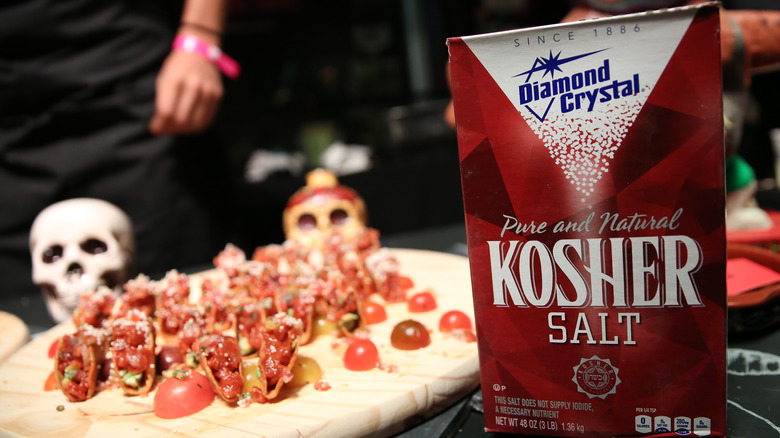Why It's Harder To Over-Season Your Food When Using Kosher Salt
It's easy to over-season your food. Despite the unmistakable importance of salt, if you are eyeballing the amount you are adding to a dish, it is a common mistake to misjudge the quantity and add more than a mouth can handle. That said, over-seasoning your food is more likely to happen with table salt than it is with kosher salt.
This is because kosher salt is a coarse salt that doesn't contain any anti-caking agents or iodine. Its crystals are large, making it less densely packed when you pour it into a measuring spoon compared to when you pour those tiny grains of table salt. In fact, if you were to compare the saltiness of equal amounts of table salt and kosher salt, you would discover table salt is twice as salty. With kosher salt, a cook has more control over the seasoning which is why you may choose to reach for it for your recipes.
Cooking vs. baking
In addition to this, in general, kosher salt's overall flavor is more pleasing than table salt. Speaking on the subject of her favorite variety, Diamon Crystal brand kosher salt, Ina Garten said she shies away from table salt because it has a metallic flavor, which is largely associated with the added clumping agents. That said, if you find that you do not have any kosher salt in your pantry, you can use table salt in a pinch, but do so cautiously. If you make this substitution, you will use less table salt than the amount of kosher salt the recipe originally calls for. For example, if you need a teaspoon of Kosher salt, use a half teaspoon of table salt.
However, there are also times when kosher salt is not always the best option, specifically when you are baking. Unfortunately, all of the qualities that make kosher salt great for cooking aren't the same qualities needed when making cookies and cakes. Kosher salt doesn't dissolve as easily or as evenly as table salt, and because of the size of the crystals, kosher salt can easily get stuck in the sieve when trying to sift your dry ingredients.

